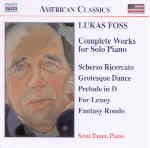Given that composer and conductor Lukas Foss also is a remarkable pianist (Glenn Gould adored his Bach playing) it’s curious that he’s written so few solo pieces for his instrument. The lion’s share date from his teenage prodigy years through his early 20s, and you might pigeonhole them as Hindemithian counterpoint and harmony courting Copland’s rhythms. Still, they reveal how the composer’s assurance, skill, energy, and sense of proportion already were in place at a young age. There are two relatively substantial “mature” pieces composed nearly 30 years apart–the witty, neo-classical Scherzo Ricercato, and the hypnotic, minimalist-inspired Solo.
It seems appropriate that Scott Dunn, a seasoned new-music pianist and close associate of Foss, not only has gathered all of his mentor’s solo piano works together under one roof, but also has programmed them for maximum contrast of style, texture, and mood. A solid, sympathetic interpreter, Dunn brings a more lyrical, less hard-hitting cumulative continuity to Solo than Kathleen Supové in her reference 1993 CRI recording, and he juggles the Scherzo Ricercato’s asymmetrical counterpoint as if both hands were engaging in animated yet relaxed bavardage. The latter contrasts to Saori Mizumura’s considerably quicker, more driving account.
Mizumura’s not quite complete Foss survey on the L’emprinte Digitale label (missing the Passacaglia and Prelude in D, but including a 1972 piano and percussion piece, Ni brut ni vitesse) generally offers more scintillating and spiky virtuosity. Her explosive accents in the Grotesque Dance and intensely articulated trills in the fourth Two-Part Invention, for example, convey a raw-nerve immediacy that Dunn’s gentler phrasing avoids. On the other hand, Dunn’s jazz-tinged phrasing of the tango-ish “New York, New York” variation proves far more idiomatic and characterful than Mizumura’s stiffer rendition. All told, a valuable release, and well engineered too. [2/14/2005]
































